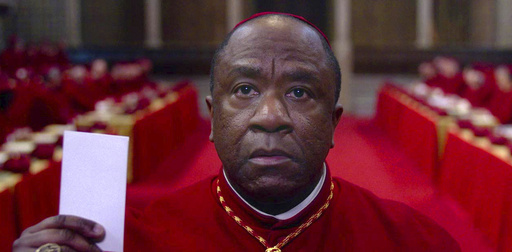
NEW YORK — Robert Harris, known for his engaging historical fiction, found inspiration for his new work while watching the election of Pope Benedict unfold on live television. Having just finished a trilogy about Cicero, the spectacle of the conclave, complete with the iconic smoke signaling a decision, piqued his curiosity. Harris observed the faces of the cardinal electors crowding the windows of the Sistine Chapel and was reminded of ancient Roman senators, leading him to suspect there were compelling stories to be told about these powerful figures.
This inspiration led him to pen the 2016 novel “Conclave,” which delves into the intricate dynamics of a papal election, cleverly portraying the pretenses of the contenders who must feign indifference to winning the coveted position. Although the idea of a film about elderly cardinals selecting a pope may not have seemed commercially viable, director Edward Berger’s adaptation has flourished into a sophisticated and engaging drama, featuring Ralph Fiennes in a leading role that captivates through meaningful dialogue and an exceptional cast.
“Conclave,” set to hit theaters this Friday through Focus Features, already finds itself in the midst of awards season discussions. Following Berger’s success with “All Quiet on the Western Front,” this film is being highlighted as a significant contender for the Academy Awards, with the possibility of Fiennes earning his third nomination for his nuanced performance. In a cinematic landscape that has largely shifted away from adult dramas, “Conclave” poses the question of whether it can rekindle interest in mid-budget films aimed at grown-up audiences.
The film was produced without official Vatican involvement, filmed at the renowned Cinecittà studios in Rome, and has a budget of around $20 million. The screenplay, penned by Peter Straughan, primarily centers on a procedural narrative, woven with spiritual themes. Berger aimed to create a film reminiscent of the political thrillers of the 1970s, mirroring films like “All the President’s Men,” where intensity is built through close-quarters tension and subtle atmospherics.
Fiennes’ performance is central to the film’s emotional weight, portraying Cardinal Lawrence, who spends much of the story listening and navigating a labyrinth of intrigue and shifting loyalties. The film’s intensity is realized through its close-ups of Fiennes, a renowned actor adept at conveying complex inner dialogues through mere facial expressions. He articulates how important it is for the actor’s internal landscape to resonate when the camera is focused on them.
Stanley Tucci, who plays Cardinal Bellini alongside Fiennes, commented on the film’s maturity and the experienced ensemble involved. He remarked on how fulfilling the role has been, reigniting his passion for acting after many years in the industry. The film’s structure features a predominantly male cast, yet it hints at broader themes regarding women’s roles within the Catholic Church—a reflection on the complexities of one of the oldest institutions in history.
The concept of doubt is woven throughout “Conclave,” with Cardinal Lawrence urging his fellow cardinals to prioritize uncertainty in their quest for a new pope. As the narrative progresses, the weight of this quest weighs heavily on his faith, a thematic element that resonates deeply with Fiennes on a personal level. He expressed that as he ages, his own uncertainties about life and meaning have grown, mirroring his character’s struggles.
To prepare for the role, Fiennes even donned authentic cardinal attire, finding the garments surprisingly comfortable and empowering. He explained that the design allowed for a sense of authority and control, reinforcing the character’s significant presence within the film’s context.
Despite the buzz surrounding potential awards, Fiennes remains grounded, preferring to let the work itself speak volumes. He shares the belief with Berger that the film’s impact will resonate more than any accolades. As Harris reflects on the adaptation, he noted the value of presenting complex characters within such an entrenched institution. As they approach the film’s release, both Harris and Berger express a desire to show “Conclave” to Vatican officials, indicating a strong interest from religious leaders to engage with the film’s portrayal of their world.
Harris recalls receiving a heartfelt letter from the late British Cardinal Cormac Murphy-O’Connor, who praised his depiction of a cardinal struggling with their convictions. The letter reaffirmed the thoughtful approach Harris took in crafting his narrative around moral complexity and human frailty, even hinting at the startling plot twists that he recognized as the imaginative fabric of storytelling.
